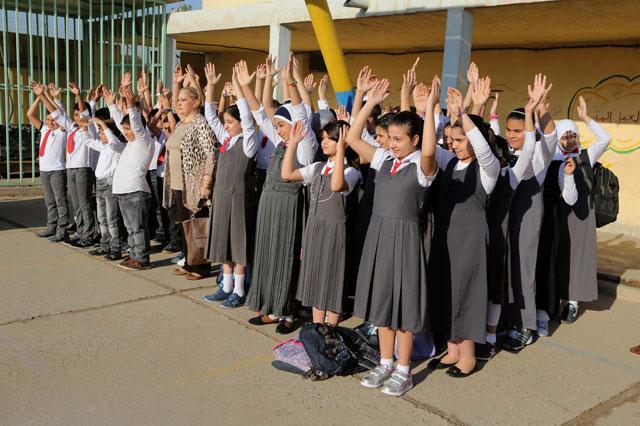You are here
‘Smaller scale NGOs also at stake due to funding shortages’
By Camille Dupire - Nov 05,2018 - Last updated at Nov 05,2018

The Finnish NGO, Finn Church Aid provides a wide range of vocational trainings inside and outside the refugee camps in Jordan (Photo courtesy of FCA)
AMMAN — As UN agencies working in Jordan are sounding the alarm over the funding shortages they are facing for the new academic year, smaller NGOs are also concerned by the impact such shortages will cause to their humanitarian programmes.
"Starting next January, we will have to put on hold our training centre for host communities in Jabal Nuzha in Amman, as we will not receive enough funding to finance both our activities inside and outside the camps," said Jehan Zaben, programme manager at Finn Church Aid (FCA) Jordan, warning of "the consequences it will have on all the groups currently empowered by the educational services provided there".
Established in 2016 in one of east Amman's underprivileged neighbourhoods, the centre has provided some thousands of refugees and Jordanians with capacity training in mobile maintenance and English classes, among other subjects.
"Entirely free and open to anyone who knocks at our door, the programme lasts three to four months and has proved to be extremely valuable for its beneficiaries," Zaben told The Jordan Times in an interview on Monday, citing the success story of a self-educated trainer who managed to establish his own mobile repair business, therefore enhancing his livelihood.
"While most of the NGOs and aid organisations are located inside the camps, over 88 per cent of refugees are currently living in host communities, which means that they, too, are in dire need of assistance," the programme manager underlined, noting that FCA beneficaris include Iraqi, Sudanese and Yemeni refugees, in addition to Jordanians and Syrian refugees, with a special focus on youth between the ages of 12 and 30.
Built on the belief that voluntarism and responsibility enhance self empowerment, FCA's programmes welcome "anyone who wants to learn and participate in our activities, without offering them any compensation in return", according to Zaben, who said that word of mouth and community mobilisers are used to acquaint locals with the centre's activities.
"Contrary to other NGOs, we do not offer free transportation, or any kind of material return for our beneficiaries, which means that they only come by out of free will, and they need to be committed," she explained.
"Students come after or before school, depending on the school shift they attend, and we make sure that they do not drop out of school and continue their education while being enrolled in the programme. Our teachers — all from the local community — follow up with the students to make sure they do not miss out on school, otherwise they are not allowed to attend the centre's activities," the FCA official pointed out.
In the camps, FCA runs similar activities, including technical, educational and recreational services that encompass hairdresser and barber training, circus, football, chess and music activities, among many others, which offer "a safe recreational escape from the daily life of the camp".
For Zaben, the shortage in FCA funding will further be compounded by the recent UN agencies' financial struggles, as she said "students who will not be able to attend UNICEF-run schools might become drop-outs and therefore be unable to benefit from any of these services".
"We want to educate children by any means, whether vocational, educational or even play, but this is a big challenge ahead of us, which is very worrisome," the programme manager continued, voicing hope to see the organisation gather more funding before next year.
Related Articles
AMMAN — Dutch Youth Creativity Award (Dyaa) kicked off on Wednesday at the Jordan University of Science and Technology (JUST).
Classes started a month behind schedule Wednesday in many areas of Iraq because some schools are crowded with families seeking refuge from violence elsewhere in the country.
AMMAN — The Health Ministry on Tuesday said there was no need to suspend classes in schools where some their students are diagnosed with H1N















